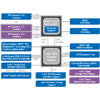- Qualcomm Launches Snapdragon 4 Gen 2 Mobile Platform
- AMD Launches Ryzen PRO 7000 Series Mobile & Desktop Platform
- Intel Launches Sleek Single-Slot Arc Pro A60 Workstation Graphics Card
- NVIDIA Announces Latest Ada Lovelace Additions: GeForce RTX 4060 Ti & RTX 4060
- Maxon Redshift With AMD Radeon GPU Rendering Support Now Available
Battle of the SATA 3.0 Controllers

With newer SSDs now coming well within 10% of maxing out a SATA 3.0 port, it’s important to make sure that your motherboard is properly equipped to handle such drives if planning to buy one. In our testing, while AMD’s and Intel’s solutions offered superb performance, Marvell’s leaved a bit (or a lot) to be desired.
Page 3 – HD Tune Pro, Palimpsest Disk Utility
HD Tune’s algorithms are not built specifically for SSDs, and with the results seen, it shows. But it still acts as a good benchmark given its popularity, and also the fact that we can still see the scaling that we’d expect, given the other benchmark results.


With the performance seen on Intel’s chipset on the previous page, seeing such a low Minimum result for it here is quite surprising. AMD’s results weren’t that impressive either, though both settle in fine with the Average and Maximum. Interestingly, Marvell beat out the pack with its Minimum result, but failed to impress with its other results – especially its access times.
The final benchmark we ran was based in Linux, using the GNOME Disk Utility, also known as Palimpsest. The reason for using this benchmark is because like ATTO, Palimpsest has the uncanny ability to deliver results that many would consider to be the theoretical maximum for any SSD. In the case of our testing here, the results managed to surpass what we saw with ATTO:


AMD and Intel both managed to surpass Kingston’s own performance ratings, availing a near 10MB/s premium on both the read and write. The performance issues with the Marvell however become incredibly clear here, with its write performance proving to be the lowest seen in any of our benchmarks.
Let’s wrap things up on the following page.
Support our efforts! With ad revenue at an all-time low for written websites, we're relying more than ever on reader support to help us continue putting so much effort into this type of content. You can support us by becoming a Patron, or by using our Amazon shopping affiliate links listed through our articles. Thanks for your support!





